安徒生童话经典故事
安徒生最经典10个故事

安徒生最经典10个故事1、《海的女儿》:小人鱼为了能和自己所爱的陆地上的王子在一起.用自己美妙的嗓音和三百年的生命换来了巫婆的药酒,于是,她有了一双美丽的脚,每走一步就像走在碎玻璃上一样疼痛。
眼看着王子和别人结婚,她宁可牺牲自己的生命,也要为王子祝福。
2、《夜莺》:夜莺那曼妙的嗓备,赢得了全世界博学之士的推崇,也赢得了中国皇帝的眼泪。
在皇帝弥留之际,夜莺再次来到皇帝的身边为他歌唱,阎王使者潸然泪下后飘然离去,皇帝的生命得到了延续。
3、《瓶颈》:一只不断梦想着到皇宫酒窖的香槟酒瓶子被普通人买去,并漂洋过海,升到高空,装过药酒,装过种子,最后却摔破成了一只瓶脖子,可它最后却那么快乐。
那是因为它终于领悟到,原来自己身边的一切才是对自己最为重要的。
4、《园丁与主人》:拉森是一个忠诚的、有天赋的园丁,他一生都在照顾主人的园子。
但是,主人却对他的天才园艺视而不见,只有不停的抱怨。
在经历一场暴风雨后。
主人终于认识到了拉森的忠实和聪明。
5、《老爹做的事总是对的》:在不同的人那里,对快乐的看法是那么的不一样。
而在对快乐看法一致的人那里,生活在一起真是一种幸福。
老爹用一匹好马换来了一头奶牛,又用奶牛换回了一只鹅,用鹅换了鸡,最后用鸡换回了一麻袋苹果,老伴竟对老爹的做法非常认同并亲吻了他,和老爹打赌老伴会生气的两位绅士输了,认识到他们是真的非常幸福,由此改变了看法。
6、《肉肠签子汤》:在厨房地下室里,耗子们正在用发霉的面包、熏咸肉和馊牛奶举办一年一度的宴会。
耗子太后给耗子国王下了最后的通牒,必须从7位公主里选择一个做皇后。
国王深思熟虑后宣布,谁能给他带回肉肠签子汤的制作方法,谁就能成为他的新娘。
最后,出乎意料的是,聪明、机智的耗子厨娘赢得了胜利,当上了皇后。
肉肠签子汤是丹麦的一句谚语,寓意为言之无物的谈话或文章。
7、《屎壳郎》:皇宫马厩的一只屎壳郎竟然要求和皇帝的战马享有一样的待遇——钉上金掌。
为此,他不惜游历一番,以证明自己和那匹马一样,是个不可小看的人物。
安徒生童话故事汇总

安徒生童话故事(经典版)编制人:__________________审核人:__________________审批人:__________________编制单位:__________________编制时间:____年____月____日序言下载提示:该文档是本店铺精心编制而成的,希望大家下载后,能够帮助大家解决实际问题。
文档下载后可定制修改,请根据实际需要进行调整和使用,谢谢!并且,本店铺为大家提供各种类型的经典范文,如述职报告、工作计划、合同协议、心得体会、策划方案、条据书信、规章制度、教学资料、作文大全、其他范文等等,想了解不同范文格式和写法,敬请关注!Download tips: This document is carefully compiled by this editor. I hope that after you download it, it can help you solve practical problems. The document can be customized and modified after downloading, please adjust and use it according to actual needs, thank you!Moreover, our store provides various types of classic sample essays, such as job reports, work plans, contract agreements, insights, planning plans, policy letters, rules and regulations, teaching materials, complete essays, and other sample essays. If you would like to learn about different sample formats and writing methods, please pay attention!安徒生童话故事安徒生童话故事(14篇)在学习、工作或生活中,大家都看过童话吧,童话故事都有哪些经典的童话故事呢?下面是本店铺为大家收集的安徒生童话故事,欢迎大家分享。
安徒生童话故事
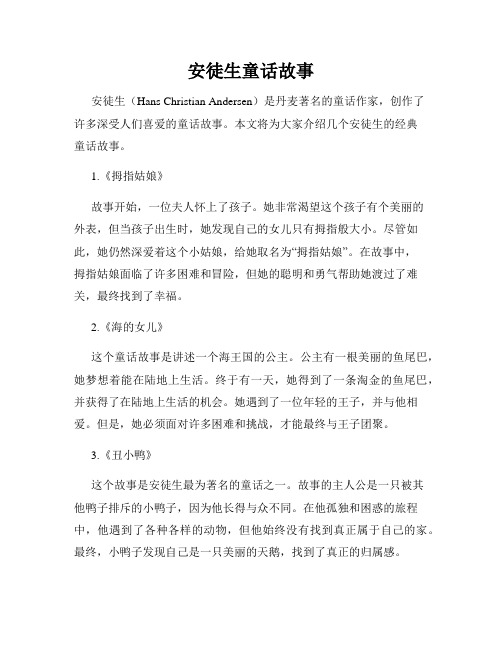
安徒生童话故事安徒生(Hans Christian Andersen)是丹麦著名的童话作家,创作了许多深受人们喜爱的童话故事。
本文将为大家介绍几个安徒生的经典童话故事。
1.《拇指姑娘》故事开始,一位夫人怀上了孩子。
她非常渴望这个孩子有个美丽的外表,但当孩子出生时,她发现自己的女儿只有拇指般大小。
尽管如此,她仍然深爱着这个小姑娘,给她取名为“拇指姑娘”。
在故事中,拇指姑娘面临了许多困难和冒险,但她的聪明和勇气帮助她渡过了难关,最终找到了幸福。
2.《海的女儿》这个童话故事是讲述一个海王国的公主。
公主有一根美丽的鱼尾巴,她梦想着能在陆地上生活。
终于有一天,她得到了一条淘金的鱼尾巴,并获得了在陆地上生活的机会。
她遇到了一位年轻的王子,并与他相爱。
但是,她必须面对许多困难和挑战,才能最终与王子团聚。
3.《丑小鸭》这个故事是安徒生最为著名的童话之一。
故事的主人公是一只被其他鸭子排斥的小鸭子,因为他长得与众不同。
在他孤独和困惑的旅程中,他遇到了各种各样的动物,但他始终没有找到真正属于自己的家。
最终,小鸭子发现自己是一只美丽的天鹅,找到了真正的归属感。
4.《卖火柴的小女孩》故事中的小女孩生活在寒冷的冬天,在寻找生存的过程中,她卖火柴来赚钱。
当她点燃一根被风吹灭的火柴时,她开始做奇幻的梦。
在梦中,她遇到了奶奶、圣诞树和一些美丽的幻想事物。
然而,当她醒来时,她已经死去了。
这个故事带给读者思考生活的真实与残酷。
5.《小红帽》小红帽是一个终极经典的童话故事,可以追溯到古老的民间故事。
故事中的小女孩穿着一顶红帽子去探望奶奶,途中遇到了狼。
狼跑到奶奶家里先吃了她,然后躲在奶奶的床上等候小红帽到来。
当小红帽到达奶奶家时,她被狼欺骗,最终她成功地从狼的肚子里逃脱,救出了奶奶。
这些安徒生的童话故事都有着深刻的寓意和动人的情节,让读者在想象的世界中迷失。
通过这些故事,我们能够学到很多关于勇气、爱和成长的重要价值观。
安徒生的童话故事深受老少皆宜,令人陶醉的魅力使它们成为了世界经典,直到今天仍然被广大读者喜爱。
安徒生童话故事(精选9篇)
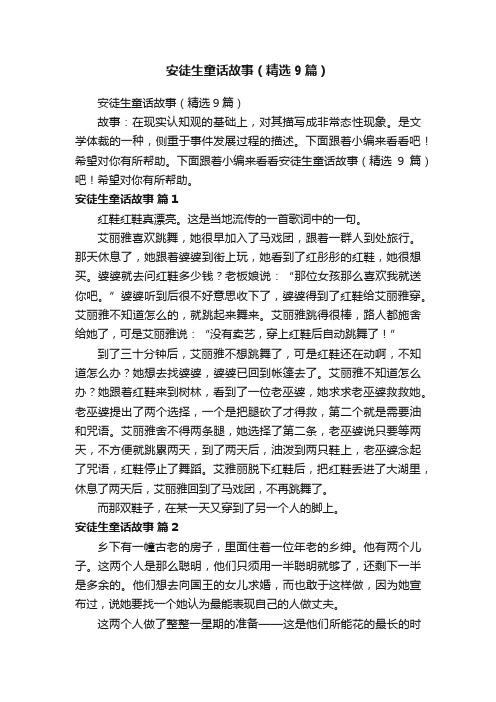
安徒生童话故事(精选9篇)安徒生童话故事(精选9篇)故事:在现实认知观的基础上,对其描写成非常态性现象。
是文学体裁的一种,侧重于事件发展过程的描述。
下面跟着小编来看看吧!希望对你有所帮助。
下面跟着小编来看看安徒生童话故事(精选9篇)吧!希望对你有所帮助。
安徒生童话故事篇1红鞋红鞋真漂亮。
这是当地流传的一首歌词中的一句。
艾丽雅喜欢跳舞,她很早加入了马戏团,跟着一群人到处旅行。
那天休息了,她跟着婆婆到街上玩,她看到了红彤彤的红鞋,她很想买。
婆婆就去问红鞋多少钱?老板娘说:“那位女孩那么喜欢我就送你吧。
”婆婆听到后很不好意思收下了,婆婆得到了红鞋给艾丽雅穿。
艾丽雅不知道怎么的,就跳起来舞来。
艾丽雅跳得很棒,路人都施舍给她了,可是艾丽雅说:“没有卖艺,穿上红鞋后自动跳舞了!”到了三十分钟后,艾丽雅不想跳舞了,可是红鞋还在动啊,不知道怎么办?她想去找婆婆,婆婆已回到帐篷去了。
艾丽雅不知道怎么办?她跟着红鞋来到树林,看到了一位老巫婆,她求求老巫婆救救她。
老巫婆提出了两个选择,一个是把腿砍了才得救,第二个就是需要油和咒语。
艾丽雅舍不得两条腿,她选择了第二条,老巫婆说只要等两天,不方便就跳累两天,到了两天后,油泼到两只鞋上,老巫婆念起了咒语,红鞋停止了舞蹈。
艾雅丽脱下红鞋后,把红鞋丢进了大湖里,休息了两天后,艾丽雅回到了马戏团,不再跳舞了。
而那双鞋子,在某一天又穿到了另一个人的脚上。
安徒生童话故事篇2乡下有一幢古老的房子,里面住着一位年老的乡绅。
他有两个儿子。
这两个人是那么聪明,他们只须用一半聪明就够了,还剩下一半是多余的。
他们想去向国王的女儿求婚,而也敢于这样做,因为她宣布过,说她要找一个她认为最能表现自己的人做丈夫。
这两个人做了整整一星期的准备——这是他们所能花的最长的时间。
但是这也够了。
因为他们有许多学问,而这些学问都是有用的。
一位已经把整个拉丁文字典和这个城市出的三年的报纸,从头到尾和从尾到头,都背得烂熟。
安徒生童话故事精选10篇
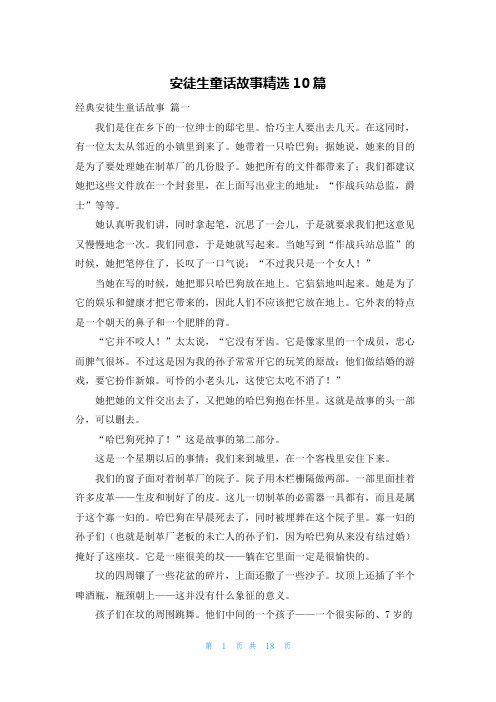
安徒生童话故事精选10篇经典安徒生童话故事篇一我们是住在乡下的一位绅士的邸宅里。
恰巧主人要出去几天。
在这同时,有一位太太从邻近的小镇里到来了。
她带着一只哈巴狗;据她说,她来的目的是为了要处理她在制革厂的几份股子。
她把所有的文件都带来了;我们都建议她把这些文件放在一个封套里,在上面写出业主的地址:“作战兵站总监,爵士”等等。
她认真听我们讲,同时拿起笔,沉思了一会儿,于是就要求我们把这意见又慢慢地念一次。
我们同意,于是她就写起来。
当她写到“作战兵站总监”的时候,她把笔停住了,长叹了一口气说:“不过我只是一个女人!”当她在写的时候,她把那只哈巴狗放在地上。
它狺狺地叫起来。
她是为了它的娱乐和健康才把它带来的,因此人们不应该把它放在地上。
它外表的特点是一个朝天的鼻子和一个肥胖的背。
“它并不咬人!”太太说,“它没有牙齿。
它是像家里的一个成员,忠心而脾气很坏。
不过这是因为我的孙子常常开它的玩笑的原故:他们做结婚的游戏,要它扮作新娘。
可怜的小老头儿,这使它太吃不消了!”她把她的文件交出去了,又把她的哈巴狗抱在怀里。
这就是故事的头一部分,可以删去。
“哈巴狗死掉了!”这是故事的第二部分。
这是一个星期以后的事情:我们来到城里,在一个客栈里安住下来。
我们的窗子面对着制革厂的院子。
院子用木栏栅隔做两部。
一部里面挂着许多皮革——生皮和制好了的皮。
这儿一切制革的必需器一具都有,而且是属于这个寡一妇的。
哈巴狗在早晨死去了,同时被埋葬在这个院子里。
寡一妇的孙子们(也就是制革厂老板的未亡人的孙子们,因为哈巴狗从来没有结过婚)掩好了这座坟。
它是一座很美的坟——躺在它里面一定是很愉快的。
坟的四周镶了一些花盆的碎片,上面还撒了一些沙子。
坟顶上还插了半个啤酒瓶,瓶颈朝上——这并没有什么象征的意义。
孩子们在坟的周围跳舞。
他们中间的一个孩子——一个很实际的、7岁的小孩子——提议开一个哈巴狗坟墓展览会,让街上所有的人都来看。
门票价是一个裤子扣,因为这是每个男孩子都有的东西,而且还可以有多余的来替女孩子买门票。
安徒生童话故事大全精选
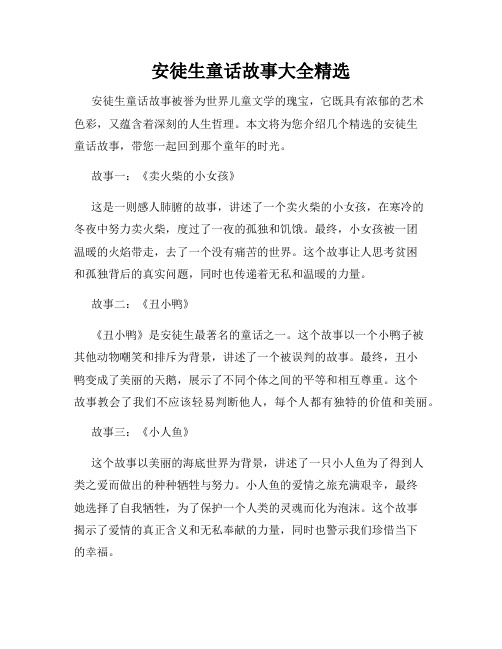
安徒生童话故事大全精选安徒生童话故事被誉为世界儿童文学的瑰宝,它既具有浓郁的艺术色彩,又蕴含着深刻的人生哲理。
本文将为您介绍几个精选的安徒生童话故事,带您一起回到那个童年的时光。
故事一:《卖火柴的小女孩》这是一则感人肺腑的故事,讲述了一个卖火柴的小女孩,在寒冷的冬夜中努力卖火柴,度过了一夜的孤独和饥饿。
最终,小女孩被一团温暖的火焰带走,去了一个没有痛苦的世界。
这个故事让人思考贫困和孤独背后的真实问题,同时也传递着无私和温暖的力量。
故事二:《丑小鸭》《丑小鸭》是安徒生最著名的童话之一。
这个故事以一个小鸭子被其他动物嘲笑和排斥为背景,讲述了一个被误判的故事。
最终,丑小鸭变成了美丽的天鹅,展示了不同个体之间的平等和相互尊重。
这个故事教会了我们不应该轻易判断他人,每个人都有独特的价值和美丽。
故事三:《小人鱼》这个故事以美丽的海底世界为背景,讲述了一只小人鱼为了得到人类之爱而做出的种种牺牲与努力。
小人鱼的爱情之旅充满艰辛,最终她选择了自我牺牲,为了保护一个人类的灵魂而化为泡沫。
这个故事揭示了爱情的真正含义和无私奉献的力量,同时也警示我们珍惜当下的幸福。
故事四:《红鞋子》《红鞋子》讲述了一个被红鞋子所控制的女孩的故事。
女孩在穿上这双鞋子后,她不受控制地跳舞,无法停下来。
这个故事反映了欲望和自由之间的矛盾,告诉人们过度追求欲望会带来痛苦和混乱。
最终,女孩只能请求别人将红鞋子砍下,才恢复了正常的生活。
故事五:《皇帝的新装》这个故事展示了一个虚伪和傲慢的皇帝被欺骗的故事。
两个骗子声称能织出一种只有智者才能看见的无形衣服,但实际上他们什么也没有织出来。
即便如此,皇帝和他的部下仍然称赞这件看不见的新衣服。
最后,一个孩子无意中揭穿了这个骗局,让人们看清了虚伪和傲慢背后的真相。
这个故事告诉我们不要被外貌和权力所迷惑,要保持清醒的思维和独立的判断。
以上是几个精选的安徒生童话故事,每个故事都带给我们深刻的思考和启示。
安徒生以其独特的艺术感和优美的语言魅力,将童话故事提升到了一个全新的高度。
安徒生童话中著名的故事
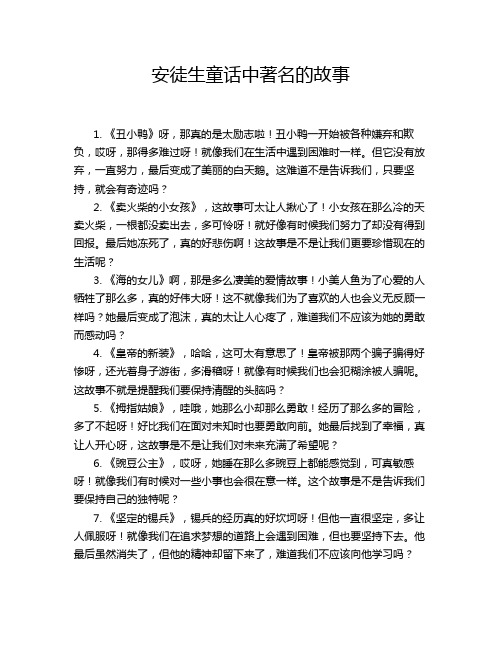
安徒生童话中著名的故事1. 《丑小鸭》呀,那真的是太励志啦!丑小鸭一开始被各种嫌弃和欺负,哎呀,那得多难过呀!就像我们在生活中遇到困难时一样。
但它没有放弃,一直努力,最后变成了美丽的白天鹅。
这难道不是告诉我们,只要坚持,就会有奇迹吗?2. 《卖火柴的小女孩》,这故事可太让人揪心了!小女孩在那么冷的天卖火柴,一根都没卖出去,多可怜呀!就好像有时候我们努力了却没有得到回报。
最后她冻死了,真的好悲伤啊!这故事是不是让我们更要珍惜现在的生活呢?3. 《海的女儿》啊,那是多么凄美的爱情故事!小美人鱼为了心爱的人牺牲了那么多,真的好伟大呀!这不就像我们为了喜欢的人也会义无反顾一样吗?她最后变成了泡沫,真的太让人心疼了,难道我们不应该为她的勇敢而感动吗?4. 《皇帝的新装》,哈哈,这可太有意思了!皇帝被那两个骗子骗得好惨呀,还光着身子游街,多滑稽呀!就像有时候我们也会犯糊涂被人骗呢。
这故事不就是提醒我们要保持清醒的头脑吗?5. 《拇指姑娘》,哇哦,她那么小却那么勇敢!经历了那么多的冒险,多了不起呀!好比我们在面对未知时也要勇敢向前。
她最后找到了幸福,真让人开心呀,这故事是不是让我们对未来充满了希望呢?6. 《豌豆公主》,哎呀,她睡在那么多豌豆上都能感觉到,可真敏感呀!就像我们有时候对一些小事也会很在意一样。
这个故事是不是告诉我们要保持自己的独特呢?7. 《坚定的锡兵》,锡兵的经历真的好坎坷呀!但他一直很坚定,多让人佩服呀!就像我们在追求梦想的道路上会遇到困难,但也要坚持下去。
他最后虽然消失了,但他的精神却留下来了,难道我们不应该向他学习吗?8. 《野天鹅》,艾丽莎为了救哥哥们,受了那么多苦,真的太感人了!这就好像我们为了家人也会不顾一切一样。
她最后成功了,真的太棒了,这个故事是不是让我们更懂得亲情的珍贵呢?9. 《打火匣》,一个神奇的打火匣带来了那么多奇妙的事情,多有趣呀!就像生活中也会有一些意外的惊喜等着我们。
经典安徒生童话故事(通用6篇)
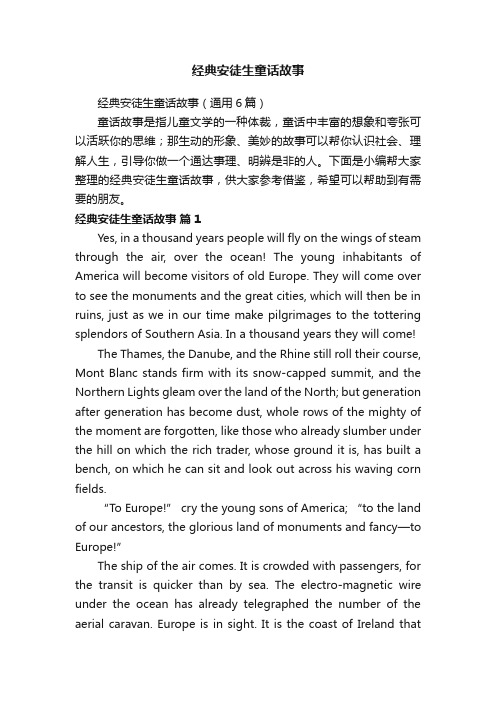
经典安徒生童话故事经典安徒生童话故事(通用6篇)童话故事是指儿童文学的一种体裁,童话中丰富的想象和夸张可以活跃你的思维;那生动的形象、美妙的故事可以帮你认识社会、理解人生,引导你做一个通达事理、明辨是非的人。
下面是小编帮大家整理的经典安徒生童话故事,供大家参考借鉴,希望可以帮助到有需要的朋友。
经典安徒生童话故事篇1Yes, in a thousand years people will fly on the wings of steam through the air, over the ocean! The young inhabitants of America will become visitors of old Europe. They will come over to see the monuments and the great cities, which will then be in ruins, just as we in our time make pilgrimages to the tottering splendors of Southern Asia. In a thousand years they will come!The Thames, the Danube, and the Rhine still roll their course, Mont Blanc stands firm with its snow-capped summit, and the Northern Lights gleam over the land of the North; but generation after generation has become dust, whole rows of the mighty of the moment are forgotten, like those who already slumber under the hill on which the rich trader, whose ground it is, has built a bench, on which he can sit and look out across his waving corn fields.“To Europe!” cry the young sons of America; “to the land of our ancestors, the glorious land of monuments and fancy—to Europe!”The ship of the air comes. It is crowded with passengers, for the transit is quicker than by sea. The electro-magnetic wire under the ocean has already telegraphed the number of the aerial caravan. Europe is in sight. It is the coast of Ireland thatthey see, but the passengers are still asleep; they will not be called till they are exactly over England. There they will first step on European shore, in the land of Shakespeare, as the educated call it; in the land of politics, the land of machines, as it is called by others.Here they stay a whole day. That is all the time the busy race can devote to the whole of England and Scotland. Then the journey is continued through the tunnel under the English Channel, to France, the land of Charlemagne and Napoleon. Moliere is named, the learned men talk of the classic school of remote antiquity. There is rejoicing and shouting for the names of heroes, poets, and men of science, whom our time does not know, but who will be born after our time in Paris, the centre of Europe, and elsewhere.The air steamboat flies over the country whence Columbus went forth, where Cortez was born, and where Calderon sang dramas in sounding verse. Beautiful black-eyed women live still in the blooming valleys, and the oldest songs speak of the Cid and the Alhambra.Then through the air, over the sea, to Italy, where once lay old, everlasting Rome. It has vanished! The Campagna lies desert.A single ruined wall is shown as the remains of St. Peter’s, but there is a doubt if this ruin be genuine.Next to Greece, to sleep a night in the grand hotel at the top of Mount Olympus, to say that they have been there; and the journey is continued to the Bosphorus, to rest there a few hours, and see the place where Byzantium lay; and where the legend tells that the harem stood in the time of the Turks, poor fishermen are now spreading their nets.Over the remains of mighty cities on the broad Danube, citieswhich we in our time know not, the travellers pass; but here and there, on the rich sites of those that time shall bring forth, the caravan sometimes descends, and departs thence again.Down below lies Germany, that was once covered with a close net of railway and canals, the region where Luther spoke, where Goethe sang, and Mozart once held the sceptre of harmony. Great names shine there, in science and in art, names that are unknown to us. One day devoted to seeing Germany, and one for the North, the country of Oersted and Linnaeus, and for Norway, the land of the old heroes and the young Normans. Iceland is visited on the journey home. The geysers burn no more, Hecla is an extinct volcano, but the rocky island is still fixed in the midst of the foaming sea, a continual monument of legend and poetry.“There is really a great deal to be seen in Europe,” says the young American, “and we have seen it in a week, according to the directions o f the great traveller” (and here he mentions the name of one of his contemporaries) “in his celebrated work, ‘How to See All Europe in a Week.’”经典安徒生童话故事篇2The country around the town of Kjge is very bare. The town itself lies by the seashore, which is always beautiful, although it might be more beautiful than it is, because all around are flat fields, and a forest a long way off. But one always finds something beautiful in the spot that is one's own home, something for which one longs, even when one is in the most wonderful spot in the world.And we must admit that the outer edge of Kjge, where small, humble gardens line the little stream that flows into the sea, could be very pretty in the summertime. This was the opinion ofthe two small children, Knud and Johanne, who were playing there, crawling under the gooseberry bushes to reach each other.In one of the gardens there stood an elder tree, in the other an old willow, and under the latter the children were especially fond of playing. Although the tree stood close beside the stream and they might easily have fallen into the water, they were allowed to play there, for the eye of God watches over little ones. Otherwise they would be very badly off indeed. Besides, these two were careful about the water; in fact, the boy was so afraid of it that in the summer he could not be lured into the sea, where the other children were fond of splashing about. As a result, he had to bear the teasing of the others as best he could.But once Johanne, the little girl, dreamed she was out in a boat, and Knud waded out to join her, with the water rising until it closed over his head. And from the moment little Knud heard of this dream he could no longer bear to be called a coward. He might really go into the water now, he said, since Johanne had dreamed it. He never carried that idea into practice, but for all that the dream remained his great pride.Their poor parents often came together, while Knud and Johanne played in the gardens or on the highroad, where a long row of willows had been planted along the ditch. These trees with their polled tops certainly did not look very beautiful, but they were there for use rather than for ornament. The old willow tree in the garden was much lovelier, which was why the children took most delight in sitting under it.In Kjge itself was a great market place, and at fair time this plaza was gay with whole streets of tents, filled with silk ribbons, boots, and everything a person might desire. There were great crowds then, and generally the weather was rainy. One couldeasily smell the odor of peasants' clothes, but this could not destroy the fragrance that streamed from a booth full of honey cakes. And best of all, the man who kept this particular booth came every year during fair time to lodge in the house of little Knud's parents. Consequently, every now and then there was a present of a bit of honey cake, and of course Johanne always received her share.But the best thing of all was that this gingerbread dealer knew all sorts of charming stories and could even tell tales about his own gingerbread cakes. One evening he told a story about them which made such a deep impression on the two children that they never forgot it. For that reason perhaps we should hear it, too, especially since it is not very long."On the shop counter," he said, "there once lay two gingerbread cakes. One was in the shape of a man with a hat on, the other of a maiden with no bonnet but with a blot of yellow on top of her head. Both their faces were on the upper side, for that was the side that was supposed to be looked at, and not the other. Indeed, most people have one side from which they should be viewed. On his left side the man wore a bitter almond for a heart; but the maiden, on the other hand, was honey cake all through. They were placed on the counter as samples, so they remained there for a long time, until at last they fell in love with each other. But neither told the other, which they should have done if they had expected anything to come of it." 'He is a man, so he must speak first,' thought the maiden. But she was quite contented, for she knew in her heart that her love was returned. His thoughts were far more extravagant, which is just like a man. He dreamed that he was a street urchin, and that he had four pennies all his own, and that he bought themaiden and ate her up."So they lay on the counter for days and weeks, and grew dry, but the thoughts of the maiden remained still gentle and womanly." 'It's enough for me that I have lived on the same table with him, ' thought the maiden, and then she broke in two." 'If only she had known of my love she would have held together a little longer,' thought he."So that's the story, and here they are, both of them," said the baker. "They're remarkable for their strange history and for their silent love, which never came to anything. And now they're both for you!" With that he gave Johanne the man, who was still in one piece, and Knud got the broken maiden; but the children had been so touched by the story that they couldn't be so bold as to eat up the lovers.Next day they took them out to the Kjge churchyard, where, winter and summer, lovely ivy covers the church wall like a rich carpet. They stood the two cake figures up among the green leaves in the bright sunshine and told a group of other children the story of the silent love that was useless; that is to say, the love was, for the story was charming, they all found.But when they looked again at the gingerbread couple they found that a mischievous big boy had eaten up the broken maiden. The children cried about that and later - probably so that the poor lover might not be left alone in the world - they ate him up, too. But they never forgot the story. The two children were always together by the elder tree or under the willow, and little Johanne sang the most beautiful songs in a voice as clear as a silver bell. Knud had not a note of music in him, but at least he knew the words of the songs, and that was something. But thepeople of Kjge, even the wife of the hardware merchant, stopped and listened when Johanne sang. "She has a very sweet voice, that little girl," she said.Those were glorious days; but glorious days do not last forever, and finally the neighbors separated. Johanne's mother died, and her father planned to marry again in Copenhagen, where he had been promised a position as messenger, a job supposed to be very profitable. While the neighbors parted with regrets, the children wept bitterly, but the parents promised to write to each other at least once a year.And Knud was made apprentice to a shoemaker, for such a big boy was too old to run around wild any longer; and, furthermore, he was confirmed.Oh, how he would have liked to see little Johanne in Copenhagen on that day of celebration! But he didn't go; and he had never been there, although Kjge is only five Danish miles away. On a clear day Knud could see the distant towers of the city across the bay, and on the day of his confirmation he could even see the golden cross on the tower of the Church of Our Lady glitter in the sun.Ah, how often his thoughts turned toward Johanne! And did she remember him? Yes! At Christmastime a letter came from her father to Knud's parents, saying that they were doing very well in Copenhagen, and Johanne could look forward to a brilliant career on the strength of her lovely voice. She already had a position in the opera house and was already earning a little money, out of which she sent her dear neighbors of Kjge a dollar for a merry Christmas Eve. Johanne herself added a postscript, asking them to drink to her health, and in the same postscript was also written, "Friendly greetings to Knud!"They all wept; but this was all very pleasant, for they were tears of joy that they shed. Knud's thoughts had been with Johanne every day, and now he knew that she also thought of him. The nearer came the end of his apprenticeship, the more clearly did he realize that he was in love with Johanne and that she must be his little wife.When he thought of this a smile brightened his face, and he drew the thread faster than before and pressed his foot against the knee strap. He didn't even pay any attention when he ran the awl deep into one of his fingers. He was determined that he would not play the silent lover, like the two gingerbread cakes. The story had taught him a lesson.Now he was a journeyman, and his knapsack was packed ready for his trip. At last, for the first time in his life, he was to go to Copenhagen, where a master was already expecting him. How surprised and happy Johanne would be to see him! She was just seventeen now, and he nineteen.He wanted to buy a gold ring for her before he left Kjge, but then decided he could get a much nicer one in Copenhagen. And so he took leave of his parents, and on a rainy, windy day in autumn set forth on foot from the town of his birth. The damp leaves were dropping from the trees, and he was wet to the skin when he arrived at his new master's home in the big city of Copenhagen. The following Sunday he would pay a visit to Johanne's father!So, on Sunday he put on the new journeyman's clothes, and the new hat from Kjge that became him very well, for till then he had only worn a cap. He easily found the house he was seeking, and mounted flight after flight of stairs until he became almost dizzy. It seemed terrible to him for people to live piled up on topof each other in this intricate city.Everything in the parlor looked prosperous, and Johanne's father received him in kindly friendship. Knud was a stranger to the new wife, but she too shook hands with him and gave him a cup of coffee."Johanne will be glad to see you," said the father. "You've grown into a nice-looking young man. Yes, wait till you see her. There is a girl who rejoices my heart, and please God she will rejoice it still more. She has her own room now and pays us rent regularly for it!"Then he knocked quite politely at his daughter's door, as if he were a stranger, and they went in.Oh, how pretty it was! he was certain there wasn't such a lovely room in all Kjge; the Queen herself could not be more charmingly lodged. There were carpets, and window curtains that hung quite to the floor, and flowers and pictures, and a velvet chair, and even a mirror as large as a door and so clear there was a danger of walking into it.A glance showed all this to Knud, and yet he could look at nothing but Johanne. She was a full-grown maiden now, quite different from Knud's memories of her, and much more beautiful. There wasn't a girl in Kjge like her. How graceful she was, and with what a strange, unsure gaze she looked at Knud! But that was only for a moment, and then she rushed toward him as if it kiss him. she did not actually do so, but she very nearly did.Yes, she was really happy to see her childhood friend again! There were tears in Johanne's eyes; she had so much to say, and so many questions to ask about everything, from Knud's parents to the elder tree and the willow, which she called Elder Mother and Willow Father just as if they had been human beings; andindeed they might be called so, just as much as the gingerbread cakes. She spoke of them too, and their silent love, and how they had lain on the shop counter and broken in two - and at this she laughed heartily, while the blood rushed to Knud's cheeks and his heart beat faster and faster. No, she had not grown haughty at all.And Knud noticed quite well that it was because of her that her parents invited him to spend the evening. With her won hands she poured out the tea and gave him a cup; and afterward she read aloud to them from a book, and it seemed to Knud that what she read was all about himself and his love, for it matched with his thoughts. Then she sang a simple little song, but her singing made it a real story that seemed to be the outpouring of her very heart.Yes, Knud knew she cared for him. He could not keep tears of joy from rolling down his cheeks, nor could he speak a single word - he seemed struck dumb. But she pressed his hand and murmured, "You have a good heart, Knud. Stay always the way you are now!"That was a magnificent evening; it was impossible to sleep afterward, and accordingly Knud did not sleep.When he had left, Johanne's father had said, "Now, don't forget us altogether. Don't let the whole winter go by before you come to us again!" Knud felt that gave him permission to repeat the call the following Sunday, and determined to do so.But every evening after work - and the working hours lasted until candlelight there - Knud went out into the town. He returned to the street in which Johanne lived, and looked up at her window. It was almost always lighted, and one evening he could even see the shadow of her face quite plainly on the curtain.That was an evening he would never forget. His master's wife did not like his "gallivanting abroad every evening," as she put it, and shook her head ruefully over him; but the master only smiled."He's just a young fellow," he said."On Sunday we shall see each other," Knud thought, "and I shall tell her how she is always in my thoughts and that she must be my little wife. I know I'm only a poor journeyman shoemaker, but I can become a master, and I'll work and save - yes, I'll tell her that! No good comes from a silent love; I've learned that much from the gingerbread!"Sunday came at last, and Knud set out, but to his great disappointment they had to tell him they were all invited out that evening. But as he left Johanne pressed his hand and said, "Have you ever been to the theater? You must go there sometime. I shall be singing on Wednesday, and if you have time that evening I'll send you a ticket. My father knows where you are living."How kind it was of her! And at noon on Wednesday he received a sealed envelope. There were no words inside, but the ticket was there, and that evening Knud went to the theater for the first time in his life. And what did he see? He saw Johanne, looking more charming and beautiful than he ever could have believed possible! To be sure, she was married to a stranger, but that was just in the play; it was only make-believe, as Knud understood very well. If it had been true, he thought, she would never have had the heart to send him a ticket so that he could go and see it. And everybody shouted and applauded, and Knud cried out, "Hurrah!"Even the King was there, smiling at Johanne, and he seemed to delight in her loveliness. How small Knud felt then! Still he loved her dearly, and felt that she loved him, too; but he knew itwas up to the man to speak the first word, as the gingerbread maiden in the story had taught him. Indeed, there was a great deal of truth in that story.So, as soon as Sunday came, he went to see her again, feeling as solemn as if he were going into a church. Johanne was at home alone; it could not have happened more fortunately."I'm glad you came," she said. "I almost sent Father after you, but I felt in my heart that you would be here this evening. I have to tell you that I am leaving for France on Friday; I must study there if I am to become a great artiste!"At those words it seemed to Knud as if the whole room were whirling round and round with him. He felt as if his heart would break; there were no tears in his eyes, but Johanne could not fail to see how stricken he was ."You honest, faithful soul!" she said.And her tenderness loosened his tongue. He told her how much he loved her and begged her to become his little wife. Then he saw Johanne turn pale as she dropped his hand and said seriously and sadly, "Dear Knud, don't make us both unhappy. I shall always be a loving sister to you, one in whom you may trust, but I shall never be anything more."Gently she placed her soft hand on his hot forehead. "God gives us the strength for much," she said, "if only we try to do our best." At that moment her stepmother entered the room, and Johanne said, "Knud is quite heartbroken because I'm going away! Come, be a man," and she laid her hand on his shoulder; it seemed as if they had been talking only of her journey. "You're a child," she laughed, "but now you must be good and reasonable, as you used to be under the willow tree when we were both children!"Knud felt as if the whole world were out of joint, and his thoughts were like a loose thread fluttering in the wind. He remained for tea, though he hardly knew if they had asked him to; and they were kind and gentle, and Johanne poured out his tea and sang to him. Her voice did not have its old tone, but still it was wonderfully beautiful and nearly broke his heart. And then they parted. Knud could not bear to offer his hand, but she took it and said, "Surely you'll shake hands with your sister at parting, old playmate!"She smiled through the tears that were in her own eyes, and repeated the word "brother". Yes, that was supposed to be a great consolation! Such was their parting.She sailed for France, and Knud wandered about the muddy streets of Copenhagen. His comrades in the workshop asked why he was so gloomy and urged him to join them and amuse himself, for he was still a young fellow.So they took him to a dance hall. He saw many pretty girls there, but there was not one to compare with Johanne; here, where he had hoped to forget her, she was more vivid than ever before the eyes of his soul. "God gives us the strength for much," she had said, "if only we try to do our best." Then a devotion came to his mind, and he folded his hands quietly. The violins played, and the girls danced gaily, and suddenly it seemed to him that he should never have brought Johanne into a place like this - for she was there with him, in his heart.Knud ran out and wandered aimlessly through the streets. He passed by the house where she had lived; it was dark there - everywhere were darkness and emptiness and loneliness. The world went in its way, and Knud went his.Winter set in, and the waters froze over; it was as ifeverything were preparing itself for burial. But when spring returned, and the first steamer was to start, an intense longing seized him to go away, far into the world, anywhere - but not too close to France. So he packed his knapsack and wandered deep into Germany, from town to town, finding rest and peace nowhere. It was not until he came to the glorious old city of Nuremberg that he could quiet his restless spirit, and there he decided to stay.Nuremberg is a strange old city, looking as if it had been cut out of an old-fashioned picture book. The streets seem to wander along just as they please. The houses did not like to stand in regular rows. Gables with little towers, arabesques, and pillars lean out over the walks, and from the queer peaked roofs water-spouts, shaped like dragons or long, slim dogs, push out far over the streets.There in the Nuremberg market place stood Knud, his knapsack, on his back. He was beside one of the old fountains, where splendid bronze figures, scriptural and historical, rose up between the gushing jets of water. A pretty little servant girl was just filling her pails, and she gave Knud a refreshing drink; and as her hand was full of roses she gave him one of them, too, and he accepted that as a good sign.From the church near by came the strains of an organ; they rang as familiar to him as the tones of the organ at home in Kjge church, and he entered the great cathedral. The sunlight streamed in through the high stained-glass windows and down between the lofty, slender pillars. His spirit found rest.And Knud found a good master in Nuremberg, and he lived in his house, and there learned to speak German.The old moat around the town of Nuremberg has beenconverted into little kitchen gardens, but the high walls with their heavy towers are standing yet. The ropemaker twists his cords on a wooden gallery along the inside of the town wall, where elderbushes grow out of the cracks and clefts, spreading their green branches over the small, lowly houses below. In one of these houses Knud lived with his master; and over the little garret window where he slept the elder tree waved its branches.Here he lived for a summer and winter. But when spring returned he could bear it no longer, for the elder was blooming and the fragrance of its blossoms carried him back to home and the garden at Kjge. So Knud left that master and found another farther in town, over whose house no elderbush blossomed.His new workshop was close to one of the old stone bridges, by an ever-foaming, low water mill. The stream roared past it, hemmed in by the houses, whose decayed old balconies looked about to topple into the water. No elder grew here - there was not even a little green plant in a flowerpot - but just opposite stood a grand old willow tree that seemed to cling fast to the house, as if it feared being carried away by the stream. It stretched its branches out over the river, just as the willow at Kjge spread its arms across the stream by the gardens of home.Yes, Knud had gone from the Elder Mother to the Willow Father. This tree had something, especially on moonlit evenings, that went straight to his heart, and that something was not of the moonlight but of the old willow tree itself.He could not remain there. Why not? Ask the willow tree; ask the blossoming elder! And so he bade farewell to his kind master and to Nuremberg and traveled on further.To no one did he speak of Johanne, but hid his sorrow in his innermost heart; and he thought of the deep meaning of the oldstory of the gingerbread. Now he understood why the man had a bitter almond for a heart - he himself had felt the bitterness of it. And Johanne, who was always so gentle and smiling, she was only like the honey cake.The strap of Knud's knapsack seemed so tight across his chest that he could scarcely breathe, but even when he loosened it he was not relieved. He saw only half the world around him; the other half he carried within him. That's how it was!Not until he was in sight of the high mountains did the world appear freer to him; now his thoughts were turned outward again, and the tears came into his eyes.The Alps seemed to him like the folded wings of the earth; what if they were to unfold themselves and display their varied pictures of black woods, foaming waters, clouds, and great masses of snow! On the last day, he thought, the world will lift up its mighty wings and mount upward to God, to burst like a soap bubble before the glance of the Highest."Ah," he sighed, "that that last day were here now!"Silently he wandered through a country that seemed to him like an orchard covered with soft turf. From the wooden balconies of the houses girls, busy with their lacemaking, nodded down at him. The summits of the mountains glowed in the red evening sun; and when he saw the blue lakes gleaming through the dark trees, he thought of the seacoast near Kjge, and there was a sadness in his heart - but it was pain no longer.There where the Rhine rolls onward like a great wave, and then bursts into snow-white, gleaming, cloudlike masses, as if clouds were being created there, with the rainbow fluttering like a loose band above them - it was there that he thought of the mill at Kjge, with its rushing, foaming stream.。
- 1、下载文档前请自行甄别文档内容的完整性,平台不提供额外的编辑、内容补充、找答案等附加服务。
- 2、"仅部分预览"的文档,不可在线预览部分如存在完整性等问题,可反馈申请退款(可完整预览的文档不适用该条件!)。
- 3、如文档侵犯您的权益,请联系客服反馈,我们会尽快为您处理(人工客服工作时间:9:00-18:30)。
安徒生童话经典故事安徒生运用儿童视角叙事模式创造了“安徒生童话”这一文体的独辟蹊径,形成了自己的创作风格,对世界文学的发展进程产生了积极的影响。
今天小编在这给大家整理了一些安徒生童话经典故事,我们一起来看看吧!安徒生童话经典故事1在浩瀚的大海深处,有个鱼儿的王国。
海王有6个美丽的女儿,尤其是小女儿比姐姐们更美丽,她善良纯洁,有着美妙动听的声音。
她们自由自在、无忧无虑地生活在大海里。
老祖母有时会给她们讲些海上面的新奇故事,使最小的公主的心中充满了对海上面世界的憧憬和渴望。
终于盼到了15岁,小公主被允许浮上海面。
她兴奋地东张西望,想把一切都收在眼里。
这时一艘大船驶近她身旁,船里有许多穿着华丽的人正在为王子庆贺生日。
当小人鱼看到英俊的王子时,深深被他吸引住了。
忽然一阵狂风暴雨,风浪摧毁了大船,人们落入水中,向海底沉下去。
小人鱼冒着生命危险,奋力托起王子的头,把他推到沙滩上,她轻轻吻了王子的额头,躲到远处的水中。
等着有人来救他。
这时教堂里走出许多人,一位年轻姑娘发现了王子,她叫来一些人,救了王子。
王子醒了,他以为是姑娘救了他,一点也不知道小人鱼。
回到海里,小人鱼把自己的心事告诉姐姐们,姐姐们告诉她这王子是谁,并指给她王子的住处。
于是小人鱼决心去找心爱的王子。
她先找到海巫婆,求她帮助自己实现变成人的愿望。
海巫婆为她配制了一种药,告诉她在黎明前喝下它,鱼尾就可变成人的腿,当然,这非常痛苦,如同尖刀劈开身体;而且,每走一步路,脚都会像刀割一样疼。
一旦变为人,就再也不能变成鱼儿回到大海了。
海巫婆还告诉她:如若王子因爱她而忘掉自己的父母并与她结为夫妇,那她将会得到不灭的灵魂;如若王子与其他女子结婚,那小人鱼将会在王子婚礼的前一天早上死去,变为海里的泡沫。
小人鱼脸色苍白,但她毫不畏惧,勇敢地向海巫婆要了药水。
作为报酬,海巫婆割去了她的舌头,拿走了她动听的声音。
深夜,小人鱼向着熟睡的亲人抛了1000个吻,心痛得似乎要裂成碎片,她悄悄地离去了。
她来到王子的宫殿,在石阶上喝了海巫婆给的药,一阵剧疼使她昏死了过去。
醒来时,她见到了王子。
对王子的问话,她不能回答,因为她成了哑巴。
她为王子跳舞,舞姿轻柔飘逸,人们都看得入了迷,谁也不知她忍受着怎样的疼痛。
王子非常爱她,一会儿也不想和她分开,但王子心中还爱着那个救过他的姑娘,王子不知道,正是小人鱼救了他。
国王、王后为王子选中了新娘,她是邻国的公主。
王子乘船去接她,发现公主正是救他的姑娘。
王子就要与心爱的姑娘结婚了,小人鱼不顾剧烈的疼痛,为他们跳起舞来,这将是她与王子在一起的最后一天了。
夜降临了,可怜的小人鱼独自站在船舷,想起了海里的亲人和家乡。
忽然,姐姐们出现了,原来,她们为了救妹妹,去求海巫婆,海巫婆要去了她们的头发,给了她们一把尖刀,让小人鱼刺中王子的胸口中,这是最后的机会了。
她看见王子在睡梦中还叫着新娘的名字,他心中只有她的存在。
小人鱼又吻了王子的额头一下,用颤抖的手把刀子扔到海里,自己也跳到大海里去了。
天亮了,人们找不到小人鱼,船边的海浪上跳动着一片白色的泡沫。
安徒生童话经典故事2有一支很粗的蜡烛,它清楚自己的价值。
我的生命源于蜡,是用模子铸成形的!它说道。
我的光比别的光都亮,燃的时间也更长一些。
我的位置在有罩的烛架上,在银烛台上!那样的生活一定很美好!油烛说道。
我不过是油烛罢了,在一根签子上浇成的烛。
我不能总是这样,我常自我安慰,我总比一根小细烛要好一丁点儿。
它们只经过两次浇浸,而我要经过八次,所以我这样粗。
我知足了!诚然,出身于蜡而不是油脂要高贵、幸福得多,可是都知道,这个世上的位置并不是由自己决定的。
您在大厅里的灯罩里,我留在厨房里,不过那也是一个很好的地方。
全家人的饭菜都是从那儿来的。
但是还有比饭食更重要的东西!蜡烛说道。
欢宴!你看欢宴时的辉煌,和自己在欢宴中放出的光辉吧!今天晚上有舞会,不一会儿我和我的家人便要去参加了。
话刚说完,所有的蜡烛便被拿走了。
不过油烛也一块被拿走了,夫人用娇巧的手亲自拿着它,把它拿到厨房。
那儿有一个小男孩手提着篮子,篮子里装满土豆,里面还有一两只苹果。
这都是善良的夫人给这个穷苦孩子的。
再给你一支烛,我的小朋友!她说道。
你的母亲要坐在那里工作到深夜,她用得着它!这家人的小女儿在一边站着。
在她听到到深夜这几个字的时候,她高兴地说道:我也要呆到深夜!我们有舞会,我会戴上大蝴蝶结的!她的脸多亮啊!那是欢乐。
没有蜡烛光能比孩子眼里闪出的光更亮!见到她这副样子我真幸福!油烛想道。
我永远不会忘记,我肯定永远再也见不到了!于是它被搁进篮子,盖起来。
小男孩带着它走了。
现在我去哪儿!油烛想道;我要到贫苦人家里去,这里连一只铜烛台恐怕都没有。
而蜡烛要插在银烛台里,看着那些贵的人。
为贵的人照明该是多么美啊!我命中注定是油脂而不是蜡!油烛来到了穷苦人家。
一个寡母带着三个孩子,住在富人家对面的一间低矮的屋子里。
上帝赐福给那位善良的夫人!她送给我这些东西。
母亲说道,这是一支很好的烛!它可以一直燃到深夜。
烛被点燃了。
呸呸!它说道。
她拿来点燃我的火柴,气味刺鼻!在富人家里,是不会用这些来款待蜡烛的!那边的蜡烛也都点燃了,烛光射到了街上。
一辆马车隆隆驶来,载着身穿华贵衣服的客人参加舞会,这时音乐响了起来。
那边开始了!油烛想。
它想着那个富有的小姑娘闪亮的面孔,比所有蜡烛都要明亮的面孔。
那个情景我再也看不到了!这时,贫苦人家最小的孩子进来了,这是一个小姑娘。
她搂着哥哥姐姐的脖子,她有一件很重要的事要讲,所以必须悄悄地说:我们今天晚上想想看!我们今天晚上吃热土豆!她的脸发出幸福的光亮,烛光正射在她的脸上。
她脸上露出的欢乐和幸福,和富人家的小姑娘一样。
那边的小姑娘说:我们今天晚上有舞会,我要戴上那个红色的大蝴蝶结!吃热土豆也那么重要吗?油烛想道。
这边的小孩也同样这么高兴!它打了一个喷嚏。
就是说,它啪啪地响了一下。
再多的动作,油烛就做不到了。
桌子摆好了,土豆也吃掉了。
哦,味道多美哟!真是一顿节日的美餐。
然后,每人还分到一只苹果。
最小的那个孩子念起了一首小诗:好上帝,谢谢你,你又让我吃饱了!阿门!说得多好,妈妈!小家伙喊了起来。
你不必问,也不必说!母亲说道。
你心中只想着让你吃饱的好上帝吧!孩子们都上了床。
每人得了一个吻,很快便都睡着了。
母亲坐着缝衣,一直缝到了深夜,为了挣钱养活他们和她自己。
富人那边烛光闪闪,乐声悠扬。
星星照着千家万户,照着富家也照着穷人,同样明亮,同样慈祥。
这真是一个十分美好的夜晚!油烛觉得。
真不知道蜡烛在银烛台里是不是更舒服一些。
要是我在燃尽以前能知道该多好!它想到了两个同样幸福的孩子,一个被蜡烛照着,一个被油烛照着!是啊,这就是整个故事!安徒生童话经典故事3美丽的乡间农舍,一只母鸭寂寞地卧在它的窝里,孵化自已的孩子。
终于,那些鸭蛋一个接一个地裂开了,“僻!僻!”鸭蛋叫起来,井伸出了它们的小头。
瞧!这些小家伙多么活泼,睁着好奇的眼睛正四下张望。
只有一只蛋还躺在那儿,没有一点儿动静。
“这一个蛋费的时间真久!”母鸭开始抱怨。
“这是一只吐绶鸡的蛋!让它躺在那儿吧。
你尽管先教别的孩子去游泳好了。
”一只来访的老母鸭这样劝着。
但是鸭妈妈还是坚持着把蛋孵了出来。
这只小鸭又大又丑,不过游起水来倒还漂亮。
鸭妈妈因此稍感欣慰,井盼望它会慢慢长得漂亮点。
可是新的生活一开始,这只最后从蛋壳里爬出的丑小鸭处处挨啄,受排挤、被讥笑,不仅在鸭中是如此,连在鸡群中也是这样。
后来的情形一天比一天更糟。
大家都要赶走这只可怜的小鸭连它自已的兄弟姐妹也对它生起气来。
于是妈妈也说:“我希望你走远些!”鸭儿们啄它,小鸡们打它,喂鸡鸭的那个女佣人也用脚踢它。
于是它闭起眼睛悲哀地逃,逃到一块住着许多野鸭的沼泽地,又逃到一间老太婆和猫儿居住的农舍,结果还是一样地受歧视,嫌它不会“眯眯”叫,小鸭苦闷极了,自个儿在水中钻来钻去,秋天时冻得“呱呱”直叫。
一天傍晚,薄暮低垂,一群美丽的天鹅从灌木林里飞出来,小鸭从未见过这么美丽的鸟,看着它们飞走了,既茫然又羡慕,心中油然涌出一种深深的爱,好像它从未爱过什么似的。
冬天来了,终于有一天小鸭昏倒了,一个农夫把他抱回家去送给了他的妻子,可是它又闯祸了,农去的妻子要用火钳打它,它鼓起翅膀飞走了,飞进了一座大花园,在这里它又遇见了美丽的天鹅。
小鸭突然忧郁地想:“我要飞向它们,飞向这些高贵的鸟儿!即使被它们打死,也总比让那些欺负自已的动物咬、啄要好受得多。
”于是它又飞到水里,向美丽的天鹅游去。
“请你们把我弄死吧!”可怜的小鸭说。
它低低地把头垂到水上,只等着一死。
但是,当它在清撤的水画看到自已的倒影,再也不是一只粗笨的,深灰色的,又丑又令人讨厌的鸭子了,而是—只天鹅时,它恍然大彻大悟。
只要是只天鹅蛋,即使生活在鸡窝里,又有什么关系呢?孩子们向它撒画包片、麦粒,许多大天鹅在它周围游泳,用嘴吻它,它感到非常幸福,快乐地想:“当我还是一个丑小鸭的时候,我做梦也没想到会有这么幸福!”安徒生童话经典故事4从前有一位王子,他想找一位公主结婚,但她必须是一位真正的公主。
于是,他走遍了全世界,想要寻到这样一位公主,可是不管他到什么地方,总会碰到一些障碍。
公主倒有的是碰到,但是他没有办法确定她们到底是不是真正的公主!她们看上去总有些地方不大对头,最后他只好回家了,心中很不开心,因为王子是那么渴望得到一位真正的公主!有一天晚上,忽然下起了一阵可怕的暴风雨,天空电闪雷鸣!这时,听到有人在外面敲门,仆人就走前去开门。
站在城外的是一位公主!可是,天哪~经过了风吹雨打之后,她的样子是多么难看啊!水沿着她的头发和衣服向下流,流进鞋尖,又从脚跟流出来。
她说她是一个真正的公主!老皇后听了之后什么也没有说,心里想:“是的,你是不是真正的公主,我们马上就可以验证出来的。
”于是,老皇后走进卧室,把所有的被褥都搬开,在床榻上放了一粒豌豆,同时她取出二十张床垫子,把它们压在豌豆上;随后,她又在这些垫子上放了二十床鸭绒被!这位公主夜里就睡在这些东西上面,早晨起床的时候,大家问她昨晚睡得怎么样?“啊,睡得非常的不舒服!”公主说:”我差不多整夜都没有合上眼!不知道我床上有件什么东西?我睡到一块很硬的东西上面,弄的我全身发青发紫,真是太不舒服了!”现在大家都看出来了,她是一位真正的公主!因为压在这二十层床垫子和二十床鸭绒被下面的一粒豌豆,她居然还能感觉得出来。
除了真正的公主以外,任何人都不会有这么嫩的皮肤的!知道这个消息之后,王子高兴极了,于是他迎娶了这公主,从此,王子和豌豆公主幸福地生活在一起!而这粒豌豆也送进了博物馆。
假如没有人把它拿走的话,现在人们还可以在那儿看到它呢!安徒生童话经典故事5有一个叫英格尔的小姑娘,她很穷,但是却生性骄傲,自以为很了不起。
她还喜欢恶作剧,要么把苍蝇的翅膀撕掉,把本来是飞虫的它们变成爬虫;要么把金龟子和甲虫穿在一根针上,翻来复去地看它们如何痛苦地挣扎,还得意洋洋地说:“这是多么有趣呀!”英格尔一天天长大了,但她并没有改变恶习,反而变得越来越顽皮。
